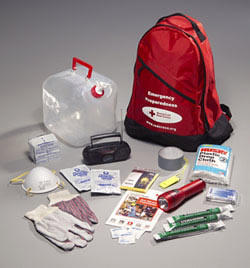Power in Preparing for Potential Blackouts

Friday, August 26, 2005 — Heat waves, heavy rain, lightning and thunderstorms and high winds – there are a number of summer weather conditions that can damage power lines and overtax power grids, causing temporary and even some long-term power outages. Even wildfires can threaten power sources or lines. The best way to cope with a summer brown or black-out situation is to have a plan in place before the lights go out.
An emergency preparedness kit should include a flashlight and portable battery-operated radio or television with batteries as well as a small supply of non-perishable food items and at least one gallon of water per person, per day. The American Red Cross pre-assembled 3-day, adult kit – seen here – includes these essentials as well as a first aid kit, 12-hour light sticks and more. (Photo Source: American Red Cross)
Sweltering summer heat – straining power grids – along with line trouble triggered rolling blackouts in parts of Southern California last night. In Florida, high winds from Hurricane Katrina knocked down trees and lines, leaving more than one million people with out power. A wildfire in Idaho prompted a brief power outage on Wednesday. A series of tornadoes hit southern Wisconsin last week bringing down lines and leaving some residents in Richland and Dane counties without power.
“A disaster strikes somewhere in the United States every 8 minutes, and they don’t need to be widespread to affect the safety of your family and your home,” said Keith Robertory, Preparedness Expert at the American Red Cross. “These incidents remind all of us how important it is for each person to plan for what they will do when impacted by a power outage and have necessary supplies ready well before the outage occur.”
Sometimes the lack of electricity is brief and merely an inconvenience, but when the problem continues and leaves a neighborhood without power for hours, days or even weeks, it can pose significant health and safety risks. The safety of perishable food can significantly drop within hours of an outage. People’s risk increase when they use candles to combat darkness and leave them unattended, even briefly, posing a serious fire hazard. The American Red Cross offers the following recommendations to prepare for power outages.
Prepare Before a Blackout Happens
Obtain or assemble essential supplies in a central location, including:
Flashlight
Batteries
Portable battery-operated radio or television
At least one gallon of water per person per day for at least three days
Non-perishable foods
Top Safety Tips for a Blackout
When a blackout does occur, there are more steps families can take to stay safe, including:
Only use a battery powered light, like a flashlight, for emergency lighting. Due to the extreme risk of fire, do not use candles during a power outage.
Turn off electrical equipment you were using when the power went out.
Avoid opening the refrigerator and freezer to keep the contents cold.
Do not run a generator inside a confined space, like home or garage due to the extreme dangers of carbon monoxide poisoning.
If you use a generator, connect the equipment you want to power directly to the outlets on the generator. Do not connect a generator to a home's electrical system unless you have an approved power transfer switch installed.
Listen to local radio and television for updated information.
“Power outages in the dog days of summer pose an added threat – heat emergencies,” said Robertory. “The problem of staying cool without electricity to power fans or air conditioners is exacerbated by the potential lack of access to clean, safe water if water treatment facilities are impacted by the outage as well.”
It is important to know how to recognize heat-related illnesses, especially in young children who may not be able to verbalize how they feel, and how to treat someone who is exhibiting signs or symptoms of heat exhaustion or stroke. Be sure to check on elderly neighbors or community members with mobility concerns, recognizing that they may need a helping hand when the power goes out.

0 Comments:
Post a Comment
<< Home